HLSC621 Reflection: Nursing Research and CAPHIA Competencies
VerifiedAdded on 2023/04/04
|6
|1214
|408
Report
AI Summary
This report is a reflective essay by a graduate nursing student, comparing their prior knowledge of nursing research from their bachelor's degree in India with their recent learning in the HLSC621 unit. The essay highlights the student's understanding of quantitative and qualitative research methods, ethical considerations in research, and the application of research findings to evidence-based nursing practice. The student discusses the importance of critical appraisal of research articles, development of research questions, and the application of CAPHIA competencies. The reflection also covers the student's growth in understanding key concepts such as ontology, epistemology, and the ethical conduct of research. The essay concludes with an assessment of the student's enhanced clinical competencies and a recognition of the importance of continuous learning in the field of nursing research.
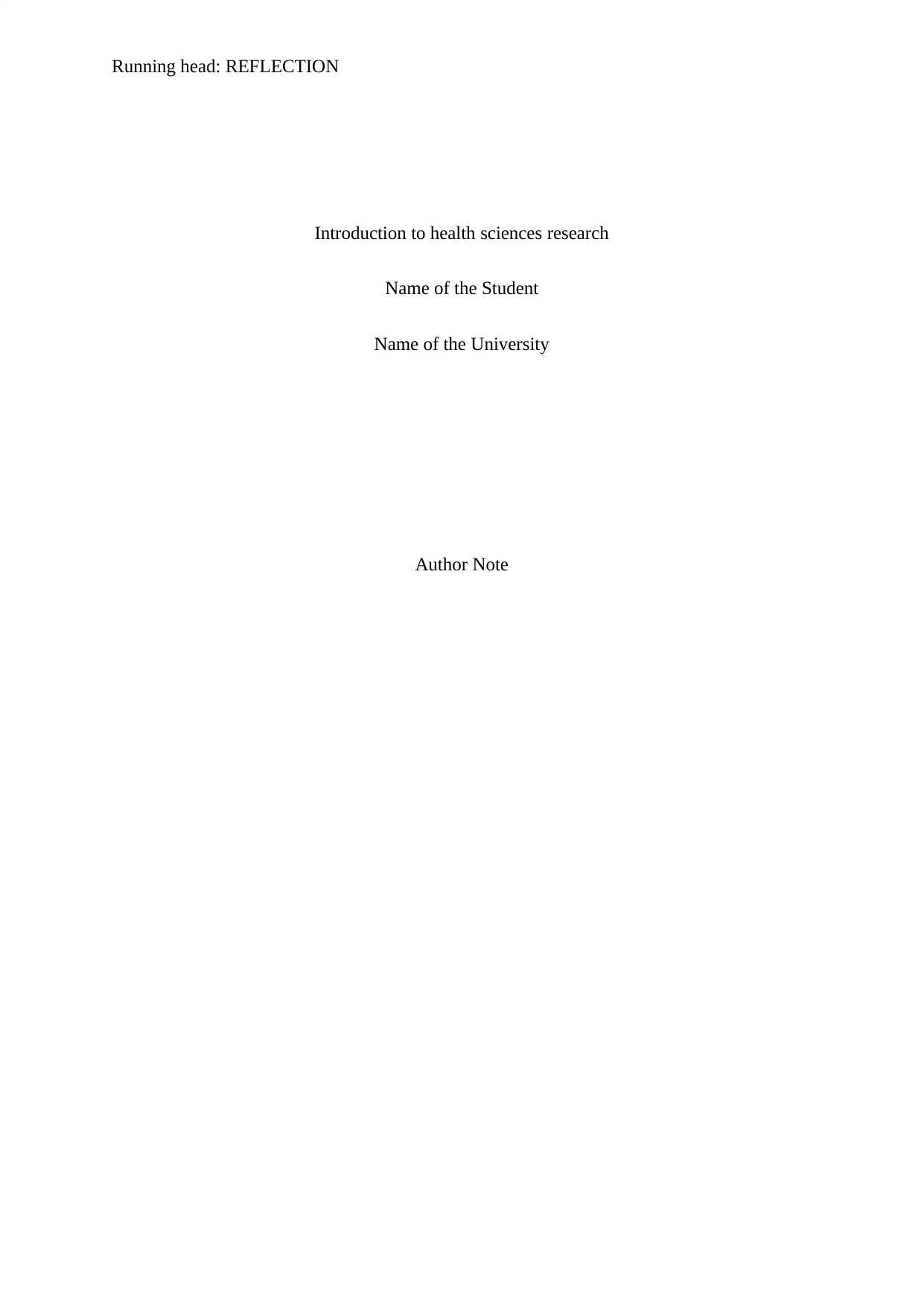
Running head: REFLECTION
Introduction to health sciences research
Name of the Student
Name of the University
Author Note
Introduction to health sciences research
Name of the Student
Name of the University
Author Note
Paraphrase This Document
Need a fresh take? Get an instant paraphrase of this document with our AI Paraphraser
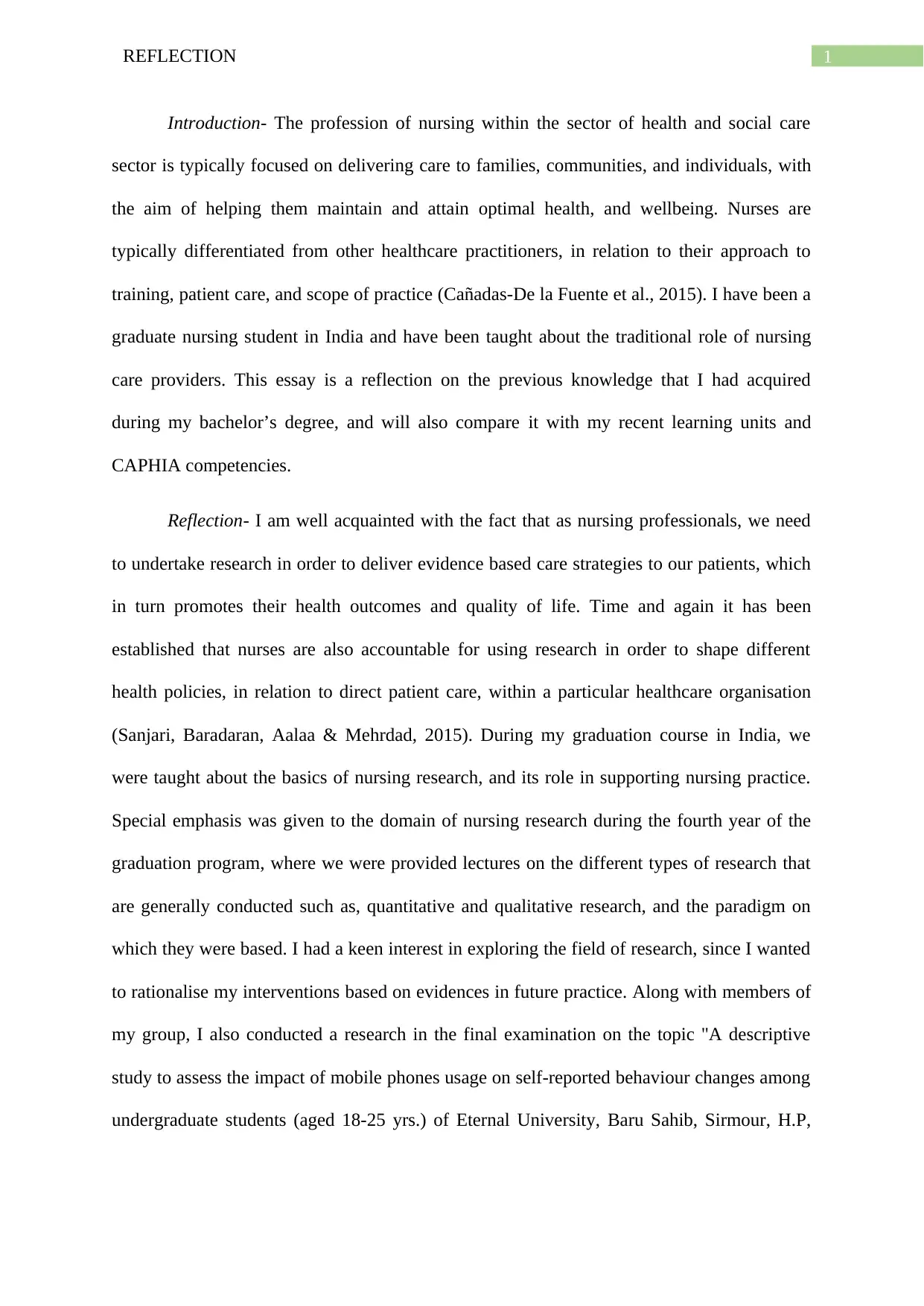
1REFLECTION
Introduction- The profession of nursing within the sector of health and social care
sector is typically focused on delivering care to families, communities, and individuals, with
the aim of helping them maintain and attain optimal health, and wellbeing. Nurses are
typically differentiated from other healthcare practitioners, in relation to their approach to
training, patient care, and scope of practice (Cañadas-De la Fuente et al., 2015). I have been a
graduate nursing student in India and have been taught about the traditional role of nursing
care providers. This essay is a reflection on the previous knowledge that I had acquired
during my bachelor’s degree, and will also compare it with my recent learning units and
CAPHIA competencies.
Reflection- I am well acquainted with the fact that as nursing professionals, we need
to undertake research in order to deliver evidence based care strategies to our patients, which
in turn promotes their health outcomes and quality of life. Time and again it has been
established that nurses are also accountable for using research in order to shape different
health policies, in relation to direct patient care, within a particular healthcare organisation
(Sanjari, Baradaran, Aalaa & Mehrdad, 2015). During my graduation course in India, we
were taught about the basics of nursing research, and its role in supporting nursing practice.
Special emphasis was given to the domain of nursing research during the fourth year of the
graduation program, where we were provided lectures on the different types of research that
are generally conducted such as, quantitative and qualitative research, and the paradigm on
which they were based. I had a keen interest in exploring the field of research, since I wanted
to rationalise my interventions based on evidences in future practice. Along with members of
my group, I also conducted a research in the final examination on the topic "A descriptive
study to assess the impact of mobile phones usage on self-reported behaviour changes among
undergraduate students (aged 18-25 yrs.) of Eternal University, Baru Sahib, Sirmour, H.P,
Introduction- The profession of nursing within the sector of health and social care
sector is typically focused on delivering care to families, communities, and individuals, with
the aim of helping them maintain and attain optimal health, and wellbeing. Nurses are
typically differentiated from other healthcare practitioners, in relation to their approach to
training, patient care, and scope of practice (Cañadas-De la Fuente et al., 2015). I have been a
graduate nursing student in India and have been taught about the traditional role of nursing
care providers. This essay is a reflection on the previous knowledge that I had acquired
during my bachelor’s degree, and will also compare it with my recent learning units and
CAPHIA competencies.
Reflection- I am well acquainted with the fact that as nursing professionals, we need
to undertake research in order to deliver evidence based care strategies to our patients, which
in turn promotes their health outcomes and quality of life. Time and again it has been
established that nurses are also accountable for using research in order to shape different
health policies, in relation to direct patient care, within a particular healthcare organisation
(Sanjari, Baradaran, Aalaa & Mehrdad, 2015). During my graduation course in India, we
were taught about the basics of nursing research, and its role in supporting nursing practice.
Special emphasis was given to the domain of nursing research during the fourth year of the
graduation program, where we were provided lectures on the different types of research that
are generally conducted such as, quantitative and qualitative research, and the paradigm on
which they were based. I had a keen interest in exploring the field of research, since I wanted
to rationalise my interventions based on evidences in future practice. Along with members of
my group, I also conducted a research in the final examination on the topic "A descriptive
study to assess the impact of mobile phones usage on self-reported behaviour changes among
undergraduate students (aged 18-25 yrs.) of Eternal University, Baru Sahib, Sirmour, H.P,
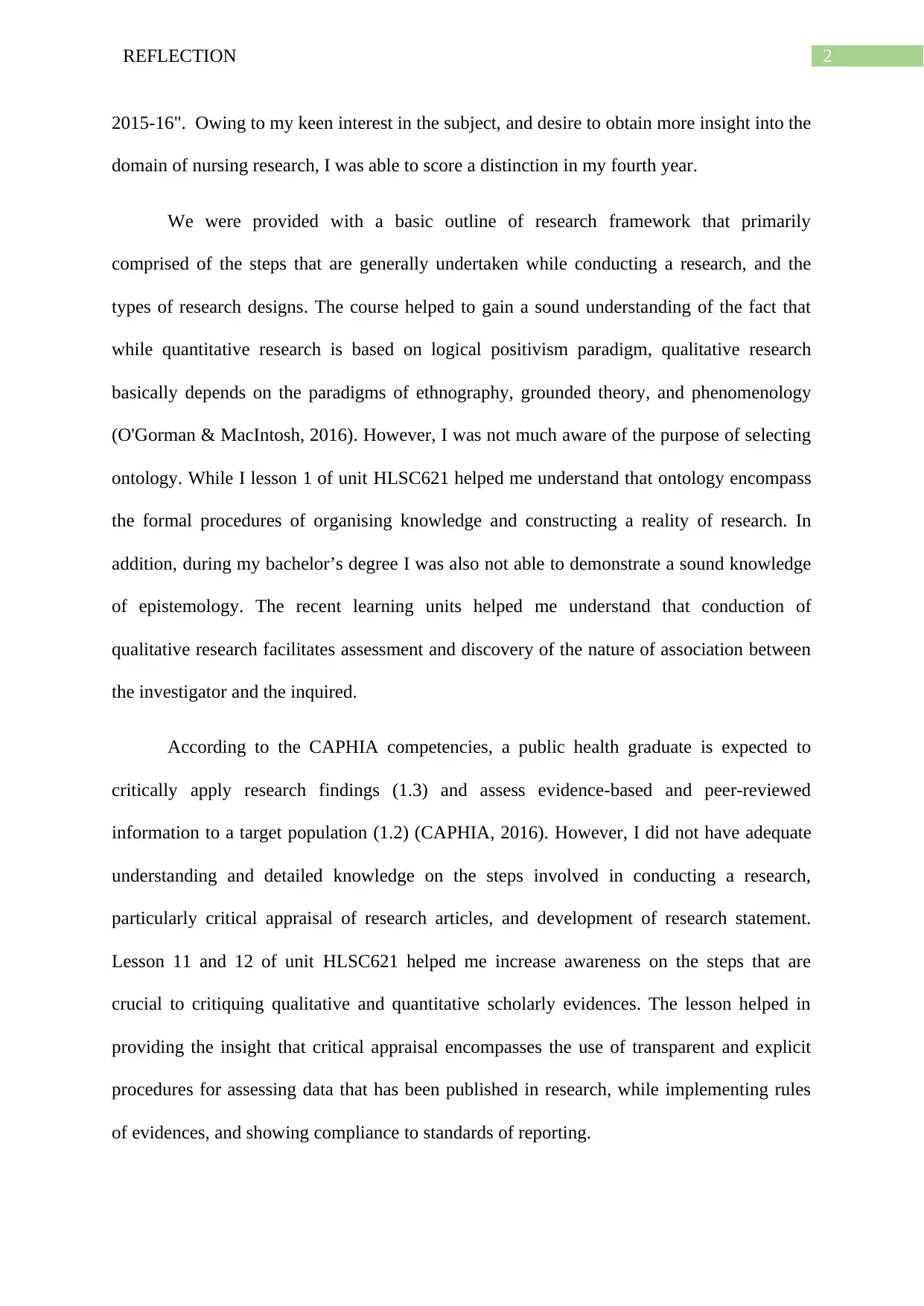
2REFLECTION
2015-16". Owing to my keen interest in the subject, and desire to obtain more insight into the
domain of nursing research, I was able to score a distinction in my fourth year.
We were provided with a basic outline of research framework that primarily
comprised of the steps that are generally undertaken while conducting a research, and the
types of research designs. The course helped to gain a sound understanding of the fact that
while quantitative research is based on logical positivism paradigm, qualitative research
basically depends on the paradigms of ethnography, grounded theory, and phenomenology
(O'Gorman & MacIntosh, 2016). However, I was not much aware of the purpose of selecting
ontology. While I lesson 1 of unit HLSC621 helped me understand that ontology encompass
the formal procedures of organising knowledge and constructing a reality of research. In
addition, during my bachelor’s degree I was also not able to demonstrate a sound knowledge
of epistemology. The recent learning units helped me understand that conduction of
qualitative research facilitates assessment and discovery of the nature of association between
the investigator and the inquired.
According to the CAPHIA competencies, a public health graduate is expected to
critically apply research findings (1.3) and assess evidence-based and peer-reviewed
information to a target population (1.2) (CAPHIA, 2016). However, I did not have adequate
understanding and detailed knowledge on the steps involved in conducting a research,
particularly critical appraisal of research articles, and development of research statement.
Lesson 11 and 12 of unit HLSC621 helped me increase awareness on the steps that are
crucial to critiquing qualitative and quantitative scholarly evidences. The lesson helped in
providing the insight that critical appraisal encompasses the use of transparent and explicit
procedures for assessing data that has been published in research, while implementing rules
of evidences, and showing compliance to standards of reporting.
2015-16". Owing to my keen interest in the subject, and desire to obtain more insight into the
domain of nursing research, I was able to score a distinction in my fourth year.
We were provided with a basic outline of research framework that primarily
comprised of the steps that are generally undertaken while conducting a research, and the
types of research designs. The course helped to gain a sound understanding of the fact that
while quantitative research is based on logical positivism paradigm, qualitative research
basically depends on the paradigms of ethnography, grounded theory, and phenomenology
(O'Gorman & MacIntosh, 2016). However, I was not much aware of the purpose of selecting
ontology. While I lesson 1 of unit HLSC621 helped me understand that ontology encompass
the formal procedures of organising knowledge and constructing a reality of research. In
addition, during my bachelor’s degree I was also not able to demonstrate a sound knowledge
of epistemology. The recent learning units helped me understand that conduction of
qualitative research facilitates assessment and discovery of the nature of association between
the investigator and the inquired.
According to the CAPHIA competencies, a public health graduate is expected to
critically apply research findings (1.3) and assess evidence-based and peer-reviewed
information to a target population (1.2) (CAPHIA, 2016). However, I did not have adequate
understanding and detailed knowledge on the steps involved in conducting a research,
particularly critical appraisal of research articles, and development of research statement.
Lesson 11 and 12 of unit HLSC621 helped me increase awareness on the steps that are
crucial to critiquing qualitative and quantitative scholarly evidences. The lesson helped in
providing the insight that critical appraisal encompasses the use of transparent and explicit
procedures for assessing data that has been published in research, while implementing rules
of evidences, and showing compliance to standards of reporting.
⊘ This is a preview!⊘
Do you want full access?
Subscribe today to unlock all pages.

Trusted by 1+ million students worldwide
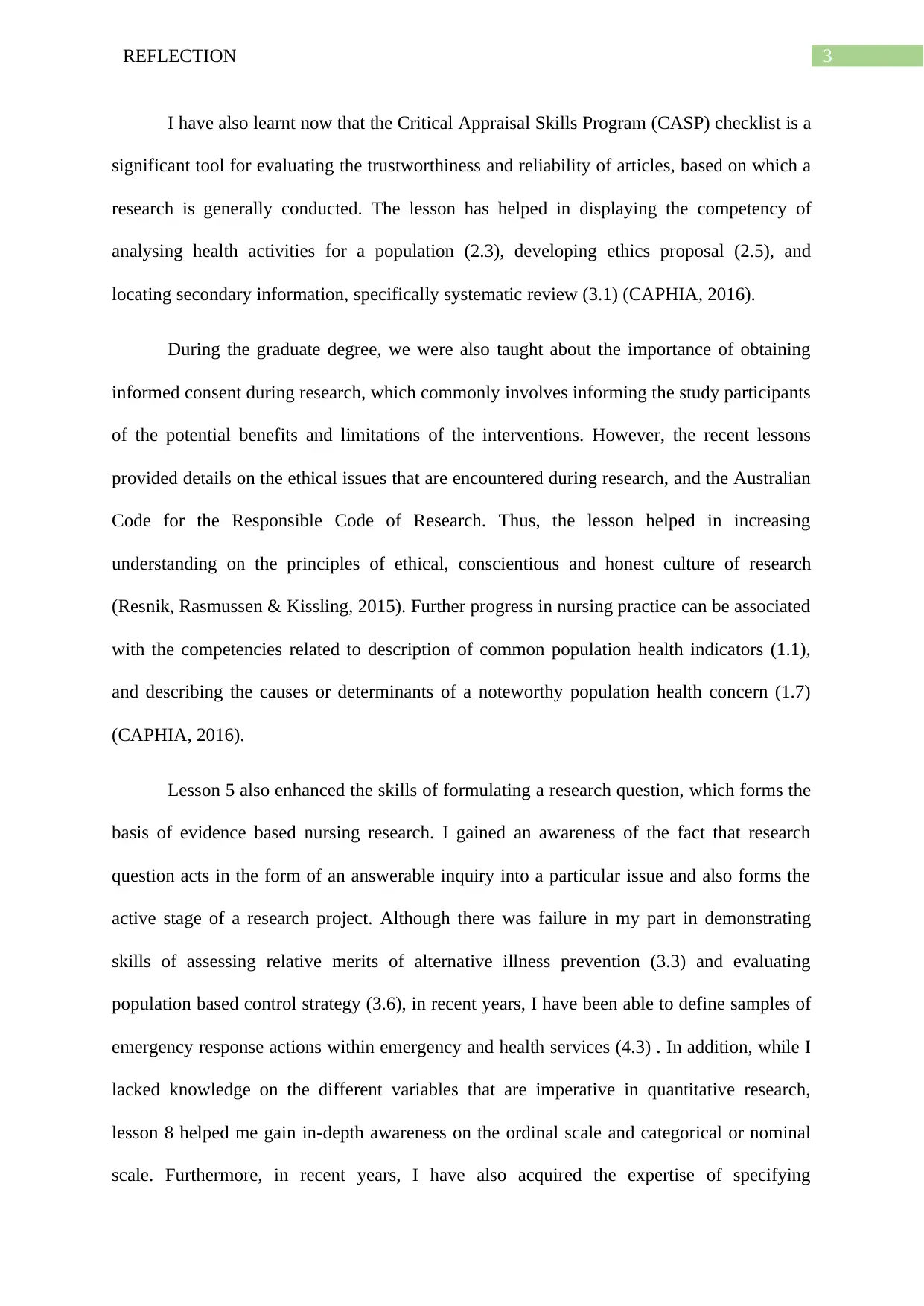
3REFLECTION
I have also learnt now that the Critical Appraisal Skills Program (CASP) checklist is a
significant tool for evaluating the trustworthiness and reliability of articles, based on which a
research is generally conducted. The lesson has helped in displaying the competency of
analysing health activities for a population (2.3), developing ethics proposal (2.5), and
locating secondary information, specifically systematic review (3.1) (CAPHIA, 2016).
During the graduate degree, we were also taught about the importance of obtaining
informed consent during research, which commonly involves informing the study participants
of the potential benefits and limitations of the interventions. However, the recent lessons
provided details on the ethical issues that are encountered during research, and the Australian
Code for the Responsible Code of Research. Thus, the lesson helped in increasing
understanding on the principles of ethical, conscientious and honest culture of research
(Resnik, Rasmussen & Kissling, 2015). Further progress in nursing practice can be associated
with the competencies related to description of common population health indicators (1.1),
and describing the causes or determinants of a noteworthy population health concern (1.7)
(CAPHIA, 2016).
Lesson 5 also enhanced the skills of formulating a research question, which forms the
basis of evidence based nursing research. I gained an awareness of the fact that research
question acts in the form of an answerable inquiry into a particular issue and also forms the
active stage of a research project. Although there was failure in my part in demonstrating
skills of assessing relative merits of alternative illness prevention (3.3) and evaluating
population based control strategy (3.6), in recent years, I have been able to define samples of
emergency response actions within emergency and health services (4.3) . In addition, while I
lacked knowledge on the different variables that are imperative in quantitative research,
lesson 8 helped me gain in-depth awareness on the ordinal scale and categorical or nominal
scale. Furthermore, in recent years, I have also acquired the expertise of specifying
I have also learnt now that the Critical Appraisal Skills Program (CASP) checklist is a
significant tool for evaluating the trustworthiness and reliability of articles, based on which a
research is generally conducted. The lesson has helped in displaying the competency of
analysing health activities for a population (2.3), developing ethics proposal (2.5), and
locating secondary information, specifically systematic review (3.1) (CAPHIA, 2016).
During the graduate degree, we were also taught about the importance of obtaining
informed consent during research, which commonly involves informing the study participants
of the potential benefits and limitations of the interventions. However, the recent lessons
provided details on the ethical issues that are encountered during research, and the Australian
Code for the Responsible Code of Research. Thus, the lesson helped in increasing
understanding on the principles of ethical, conscientious and honest culture of research
(Resnik, Rasmussen & Kissling, 2015). Further progress in nursing practice can be associated
with the competencies related to description of common population health indicators (1.1),
and describing the causes or determinants of a noteworthy population health concern (1.7)
(CAPHIA, 2016).
Lesson 5 also enhanced the skills of formulating a research question, which forms the
basis of evidence based nursing research. I gained an awareness of the fact that research
question acts in the form of an answerable inquiry into a particular issue and also forms the
active stage of a research project. Although there was failure in my part in demonstrating
skills of assessing relative merits of alternative illness prevention (3.3) and evaluating
population based control strategy (3.6), in recent years, I have been able to define samples of
emergency response actions within emergency and health services (4.3) . In addition, while I
lacked knowledge on the different variables that are imperative in quantitative research,
lesson 8 helped me gain in-depth awareness on the ordinal scale and categorical or nominal
scale. Furthermore, in recent years, I have also acquired the expertise of specifying
Paraphrase This Document
Need a fresh take? Get an instant paraphrase of this document with our AI Paraphraser
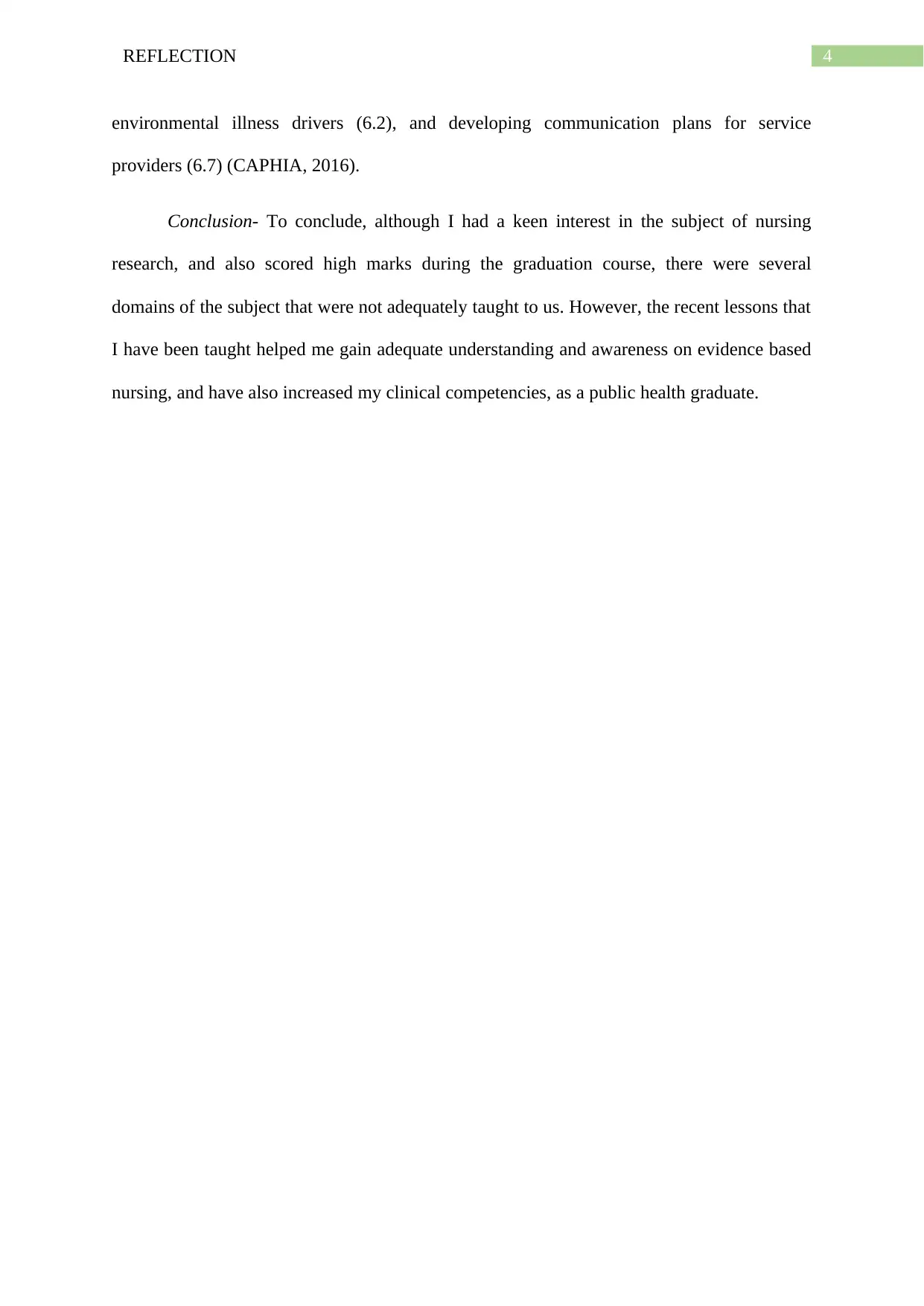
4REFLECTION
environmental illness drivers (6.2), and developing communication plans for service
providers (6.7) (CAPHIA, 2016).
Conclusion- To conclude, although I had a keen interest in the subject of nursing
research, and also scored high marks during the graduation course, there were several
domains of the subject that were not adequately taught to us. However, the recent lessons that
I have been taught helped me gain adequate understanding and awareness on evidence based
nursing, and have also increased my clinical competencies, as a public health graduate.
environmental illness drivers (6.2), and developing communication plans for service
providers (6.7) (CAPHIA, 2016).
Conclusion- To conclude, although I had a keen interest in the subject of nursing
research, and also scored high marks during the graduation course, there were several
domains of the subject that were not adequately taught to us. However, the recent lessons that
I have been taught helped me gain adequate understanding and awareness on evidence based
nursing, and have also increased my clinical competencies, as a public health graduate.
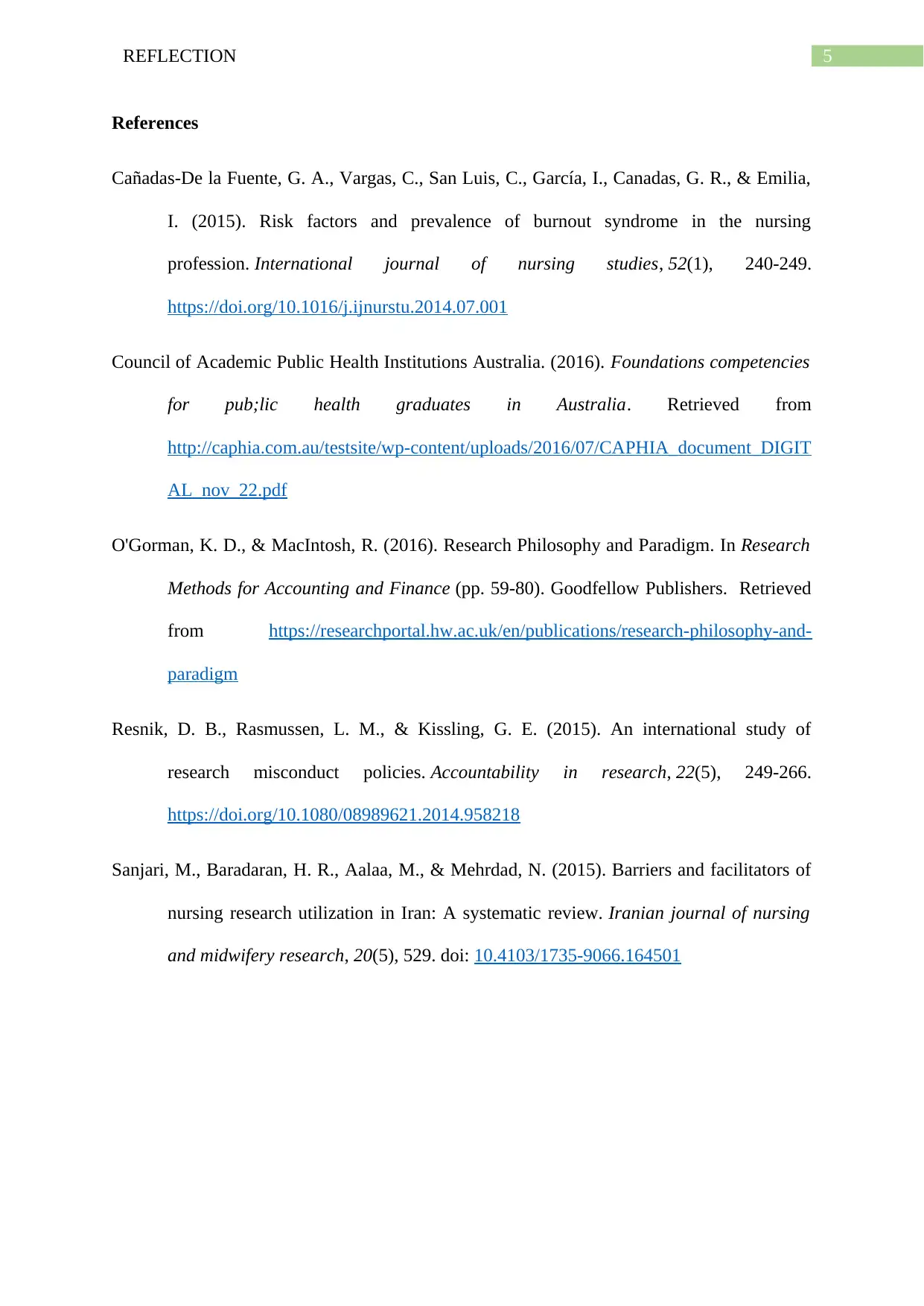
5REFLECTION
References
Cañadas-De la Fuente, G. A., Vargas, C., San Luis, C., García, I., Canadas, G. R., & Emilia,
I. (2015). Risk factors and prevalence of burnout syndrome in the nursing
profession. International journal of nursing studies, 52(1), 240-249.
https://doi.org/10.1016/j.ijnurstu.2014.07.001
Council of Academic Public Health Institutions Australia. (2016). Foundations competencies
for pub;lic health graduates in Australia. Retrieved from
http://caphia.com.au/testsite/wp-content/uploads/2016/07/CAPHIA_document_DIGIT
AL_nov_22.pdf
O'Gorman, K. D., & MacIntosh, R. (2016). Research Philosophy and Paradigm. In Research
Methods for Accounting and Finance (pp. 59-80). Goodfellow Publishers. Retrieved
from https://researchportal.hw.ac.uk/en/publications/research-philosophy-and-
paradigm
Resnik, D. B., Rasmussen, L. M., & Kissling, G. E. (2015). An international study of
research misconduct policies. Accountability in research, 22(5), 249-266.
https://doi.org/10.1080/08989621.2014.958218
Sanjari, M., Baradaran, H. R., Aalaa, M., & Mehrdad, N. (2015). Barriers and facilitators of
nursing research utilization in Iran: A systematic review. Iranian journal of nursing
and midwifery research, 20(5), 529. doi: 10.4103/1735-9066.164501
References
Cañadas-De la Fuente, G. A., Vargas, C., San Luis, C., García, I., Canadas, G. R., & Emilia,
I. (2015). Risk factors and prevalence of burnout syndrome in the nursing
profession. International journal of nursing studies, 52(1), 240-249.
https://doi.org/10.1016/j.ijnurstu.2014.07.001
Council of Academic Public Health Institutions Australia. (2016). Foundations competencies
for pub;lic health graduates in Australia. Retrieved from
http://caphia.com.au/testsite/wp-content/uploads/2016/07/CAPHIA_document_DIGIT
AL_nov_22.pdf
O'Gorman, K. D., & MacIntosh, R. (2016). Research Philosophy and Paradigm. In Research
Methods for Accounting and Finance (pp. 59-80). Goodfellow Publishers. Retrieved
from https://researchportal.hw.ac.uk/en/publications/research-philosophy-and-
paradigm
Resnik, D. B., Rasmussen, L. M., & Kissling, G. E. (2015). An international study of
research misconduct policies. Accountability in research, 22(5), 249-266.
https://doi.org/10.1080/08989621.2014.958218
Sanjari, M., Baradaran, H. R., Aalaa, M., & Mehrdad, N. (2015). Barriers and facilitators of
nursing research utilization in Iran: A systematic review. Iranian journal of nursing
and midwifery research, 20(5), 529. doi: 10.4103/1735-9066.164501
⊘ This is a preview!⊘
Do you want full access?
Subscribe today to unlock all pages.

Trusted by 1+ million students worldwide
1 out of 6
Related Documents
Your All-in-One AI-Powered Toolkit for Academic Success.
+13062052269
info@desklib.com
Available 24*7 on WhatsApp / Email
![[object Object]](/_next/static/media/star-bottom.7253800d.svg)
Unlock your academic potential
Copyright © 2020–2026 A2Z Services. All Rights Reserved. Developed and managed by ZUCOL.




